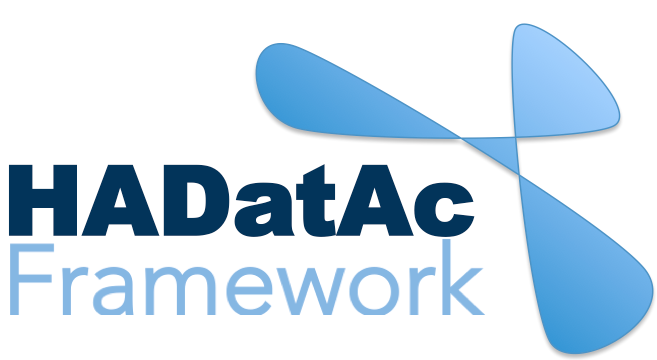-
Notifications
You must be signed in to change notification settings - Fork 24
hadatac API
Response object has two fields:
isSuccessful: "true" or "false"
body: If isSuccessful is true, response contains the data/metadata for the API call, serialized as JSON. If isSuccessful is false, contains a plaintext error message. See also the hadatac/utils/ApiUtil.java file
Access at: /hadatac/api/studies/all
Returns all Study objects in hadatac
Access at /hadatac/api/studies/:studyuri
Given the URI of a study, returns the Study object matching that URI if it exists.
Access at /hadatac/api/studies/variables/:studyuri
Given the URI of a study, returns the variables for which there are measurements in that study. NOTE: If the study metadata has been ingested but no data acquisitions exist yet, then this will return 0 variables. This method checks SOLR for measurements first.
Access at /hadatac/api/studies/units/:studyuri
Given the URI of a Study, returns the URI and label for all units of measure used in measurements in that study. NOTE: If the study metadata has been ingested but no data acquisitions exist yet, then this will return 0 units. This method checks SOLR for measurements first.
Access at /hadatac/api/studies/objectcollections/:studyuri
Given the URI of a study, returns the URIs and types for all ObjectCollections in that study.
NOTE: The full ObjectCollection object is not returned, in order to avoid an oversized response body that also contains the objects themselves. For the contents of an ObjectCollection, use the below method
Access at /hadatac/api/objectcollections/:ocuri/:offset
Given the URI of an ObjectCollection and an offset number, returns the StudyObjects in that collection in pages of 250.
NOTE: For the first page, you must provide an offset of 0
NOTE2: Right now, the page size is hard-coded at 250. This can be adjusted as needed for performance.
Access at /hadatac/api/variables/:variableuri
Given the URI of a Variable, returns the DataAcqusisitionSchemaAttribute associated with that Variable.
Access at /hadatac/api/objectcollections/size/:ocuri
Given the URI of an ObjectCollection, returns the size of that ObjectCollection.
NOTE: If the collection is expected to exist but currently contains 0 objects, isSuccessful will return "true" with a body of "0". If no collection exists with that URI, then isSuccessful returns "false".
Access at /hadatac/api/measurements/:studyuri/:variableuri
Given the URI of the study and variable, returns all relevant measurement values in Solr. Included fields: measurementuri, studyuri, studyobjecturi, variableuri, value, unituri.
Access at /hadatac/api/indicators/all
Returns the URIs for all indicator types included in all studies in hadatac.
Copyright (c) 2019, HADatAc.org

-
Installation
1.1. Installing for Linux (Production)
1.2. Installing for Linux (Development)
1.3. Installing for MacOS (Development)
1.4. Deploying with Docker (Production)
1.5. Deploying with Docker (Development)
1.6. Installing for Vagrant under Windows
1.7. Upgrading
1.8. Starting HADatAc
1.9. Stopping HADatAc -
Setting Up
2.1. Software Configuration
2.2. Knowledge Graph Bootstrap
2.2.1. Knowledge Graph
2.2.2. Bootstrap without Labkey
2.2.3. Bootstrap with Labkey
2.3. Config Verification -
Using HADatAc
3.1. Initial Page
3.1.1. Home Button
3.1.2. Sandbox Mode Button
3.2. File Ingestion
3.2.1. Ingesting Study Content
3.2.2. Manual Submission of Files
3.2.3. Automatic Submission of Files
3.2.4. Data File Operations
3.3. Manage Working Files 3.3.1. [Create Empty Semantic File from Template]
3.3.2. SDD Editor
3.3.3. DD Editor
3.4. Manage Metadata
3.4.1. Manage Instrument Infrastructure
3.4.2. Manage Deployments 3.4.3. Manage Studies
3.4.4. [Manage Object Collections]
3.4.5. Manage Streams
3.4.6. Manage Semantic Data Dictionaries
3.4.7. Manage Indicators
3.5. Data Search
3.5.1. Data Faceted Search
3.5.2. Data Spatial Search
3.6. Metadata Browser and Search
3.7. Knowledge Graph Browser
3.8. API
3.9. Data Download -
Software Architecture
4.1. Software Components
4.2. The Human-Aware Science Ontology (HAScO) -
Metadata Files
5.1. Deployment Specification (DPL)
5.2. Study Specification (STD)
5.3. Semantic Study Design (SSD)
5.4. Semantic Data Dictionary (SDD)
5.5. Stream Specification (STR) -
Content Evolution
6.1. Namespace List Update
6.2. Ontology Update
6.3. [DPL Update]
6.4. [SSD Update]
6.5. SDD Update -
Data Governance
7.1. Access Network
7.2. User Status, Categories and Access Permissions
7.3. Data and Metadata Privacy - HADatAc-Supported Projects
- Derived Products and Technologies
- Glossary